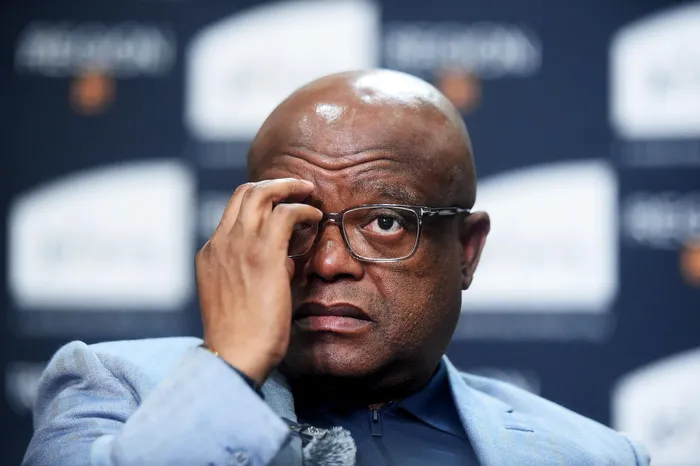Johannesburg's water crisis: Parliament holds the mayor accountable

City of Joburg Mayor, Dada Morero, has been ordered to come up with an immediate solution to the city's water crisis.
Image: Itumeleng English / Independent Newspapers
Parliament has threatened to report City of Johannesburg Executive Mayor Dada Morero for failing to ringfence money allocated for water supply and maintenance, a situation that has left many residents and businesses with dry taps.
The city had timeously failed to pay private companies, who are contracted to maintain the water infrastructure, leading to some companies withdrawing their services.
The detailed water crisis in the country’s main economic hub came up during the virtual meeting between the Water and Sanitation Portfolio Committee, the city, and its entity, Johannesburg Water, held on Friday morning.
MPs feared that the city would soon be hit by a day zero during the summer, which is known to be very hot in the city leading to residents consuming more water.
It emerged during this meeting that the city took away R4 billion from the entity and redirected it to other responsibilities.
Due to the city’s water crisis, Water and Sanitation Minister Pemmy Majodina attended the meeting.
Morero's explanation on how the city was handling the crisis angered DA MP Stephen Moore and committee Chairperson Leon Basson, who were unhappy with Morero's response to their question of when the city is going to ring-fence the budget allocated for water.
Morero was accused of being evasive in his response to questions, including about the city’s failure to pay companies that are contracted to maintain the water system on time.
Morero had told the committee that the city prioritises paying salaries, medical aid, and Eskom and Rand Water for bulk electricity and water, respectively, and thereafter paying contractors.
Basson expressed dissatisfaction with Morero’s response, which he said meant contractors would stand last in the queue.
“It does not matter whether they (contractors) go bankrupt because you are not prioritising them,” said Basson.
He called on the city to pay contractors within 30 days after submitting invoices.
“But then you decide to pay them when you have cash. That is unacceptable, and I will ask the National Treasury and the Auditor-General to investigate this because you are setting up contractors for failure.”
Basson accused Morero of failing to answer him about when the city is going to pay back the R4 billion taken from Johannesburg Water through the council resolution, which he said led to the water crisis.
“I have been a councillor for 18-and-a-half years in a municipality, and I know how it works. You take that money and you ringfence, it is not rocket science,” he said.
Basson said the council was not serious about the water problem in the city, and he demanded that the mayor tell him how he is going to deal with the crisis.
“I want that from you. Don’t tell me you are going to do it in the future.
“I want to know when you are going to ringfence the money for water so that the community can get water in their pipes.
“That is what you need to answer me now,” said Basson.
Basson’s demand came after Morero had said the council would decide in which budget cycle it would ringfence the water allocation.
“There is work that is being done between ourselves and the National Treasury, and once that work has been done, a proper announcement will be made as to how we are now going to ringfence the percentage that needs to be ringfenced,” said Morero.
He said the city was paying contractors, but it will check how many of those who are providing critical services are outstanding in terms of payments.
“Then we would then prioritise those as we pay them,” he said.
The city said one of the solutions was to drill boreholes to supply underground water where there is wastage through illegal connections.
Johannesburg Water Managing Director Ntshavheni Mukwevho attributed the city’s water scarcity to the culture of non-payment for services and leakages, saying the non-revenue water was sitting at 44.8%.
“In those 44.8% losses, 32.9% is the water that we lose through leaking pipes and other infrastructure,” he said.
Rand Water’s Group Chief Executive, Sipho Mosai, blamed the electricity cable theft at water reservoirs
Moore, who was unhappy with the council and Johannesburg Water’s handling of the water crisis, called on Majodina to intervene.
He said that, despite the city having imposed water restrictions for almost a decade, there was still no improvement in the water availability.
Water tankers, which are supplying dry areas, have been described as the source of corruption and water infrastructure sabotage.
“I would like to talk to our minister and the leadership of the department, as I am wholly unsatisfied with the response.
“The mayor did not answer what was done with the money (R4 billion), then I asked specifically about the lack of payment of contractors, which the mayor said he is working with the contractors, which does not actually address that the city is not allowing the contractors to be paid, digging us into a worse situation,” said Moore.
He said there would be more demand for water during the summer heat.
“It is going to get hotter in Gauteng, meaning there is gonna be less water and higher demand, and the communities are going to be without water.
“The communities like Westbury, Sophiatown, Ebony Park, Bruma, and Berea are going to be without water again,” said Moore.
However, Majodina said there is nothing she could do because the municipalities did not account to her department.
“We can assist in terms of regulations and monitoring. We have Rand Water, which is working very well with the municipality.
“I was going to intervene immediately if it was said by the municipality, 'our challenge is Rand Water, hence we are here',” said Majodina.
bongani.hans@inl.co.za
Related Topics: